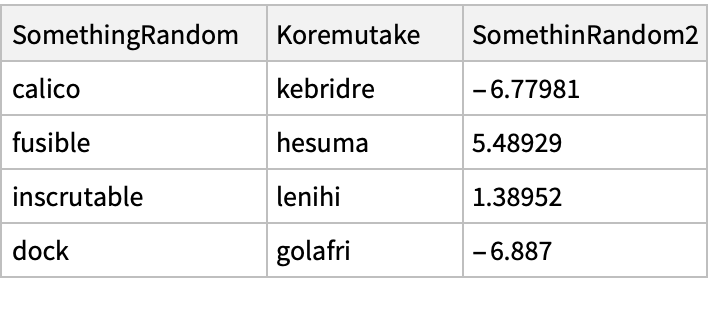Wolfram Function Repository
Instant-use add-on functions for the Wolfram Language
Function Repository Resource:
Convert to and from Koremutake memorable random strings
ResourceFunction["KoremutakeConvert"][n] converts the integer n into a Koremutake memorable string. | |
ResourceFunction["KoremutakeConvert"][s] converts the given Koremutake string s into an integer. |
Convert an integer into a Koremutake memorable string:
| In[1]:= |
| Out[1]= |
Convert a negative integer:
| In[2]:= |
| Out[2]= |
Convert a Koremutake string into an integer:
| In[3]:= |
| Out[3]= |
The function Koremutake works on lists (it has the attribute Listable):
| In[4]:= |
| Out[4]= |
Get the syllable-to-integer mapping:
| In[5]:= |
| Out[5]= |  |
Get the integer-to-syllable mapping:
| In[6]:= |
| Out[6]= |  |
Generate memorable strings for a list of large primes:
| In[7]:= | ![SeedRandom[44];
res = Association@
Map[# -> ResourceFunction["KoremutakeConvert"][#] &, Prime /@ RandomInteger[{10^5, 10^7}, 5]]](https://www.wolframcloud.com/obj/resourcesystem/images/a83/a839a5ef-ef8f-47b4-a7d3-8b1fb3fbe7fa/6fb4795e7aea2965.png) |
| Out[7]= |
Convert the obtained memorable strings into integers:
| In[8]:= |
| Out[8]= |
Random integers can be converted to memorable strings:
| In[9]:= |
| Out[9]= |
Using the resource function Soundex, you can "generalize" the Koremutake representations into Soundex codes:
| In[10]:= |
| Out[10]= |
| In[11]:= |
| Out[11]= |
Note that variations of "dribro" and "branaby" are represented with the same Soundex codes:
| In[12]:= |
| Out[12]= |
The variations with "too many" consonants are not recognized by KoremutakeConvert:
| In[13]:= |
| Out[13]= |
Here a random tabular dataset is generated with the resource function RandomTabularDataset, which has a "Koremutake" column:
| In[14]:= | ![SeedRandom[564];
ResourceFunction[
"RandomTabularDataset"][{4, {"SomethingRandom", "Koremutake", "SomethinRandom2"}}, "Generators" -> <|
"Koremutake" -> Function[{n}, ResourceFunction["KoremutakeConvert"][
RandomInteger[{0, 10^6}, n]]]|>]](https://www.wolframcloud.com/obj/resourcesystem/images/a83/a839a5ef-ef8f-47b4-a7d3-8b1fb3fbe7fa/4cb791fa92cf2287.png) |
| Out[14]= |  |
KoremutakeConvert is self-inverting:
| In[15]:= |
| Out[15]= |
Get the number represented by "Koremutake", find the list of prime factors and represent those factors with Koremutake strings:
| In[16]:= |
| Out[16]= |
| In[17]:= |
| Out[17]= |
| In[18]:= |
| Out[18]= |
Find pet names that are valid Koremutake strings:
| In[19]:= | ![AbsoluteTiming[
pnres = Quiet[
Map[AssociationThread[
Keys[#] -> ResourceFunction["KoremutakeConvert"][Keys[#]]] &, ResourceFunction["RandomPetName"][All]]];
pnres = Map[Select[#, IntegerQ] &, pnres];
]](https://www.wolframcloud.com/obj/resourcesystem/images/a83/a839a5ef-ef8f-47b4-a7d3-8b1fb3fbe7fa/12e647bb65ac3bab.png) |
| Out[19]= |
Here is the number of pet names that are Koremutake strings per species:
| In[20]:= |
| Out[20]= |
Here are samples per species of Koremutake pet names:
| In[21]:= |
| Out[21]= |
Generate random numbers:
| In[22]:= |
| Out[22]= |
Convert to Koremutake strings and make a "phrase":
| In[23]:= |
| Out[23]= |
Speak the Koremutake representations of the random numbers:
| In[24]:= |
This work is licensed under a Creative Commons Attribution 4.0 International License